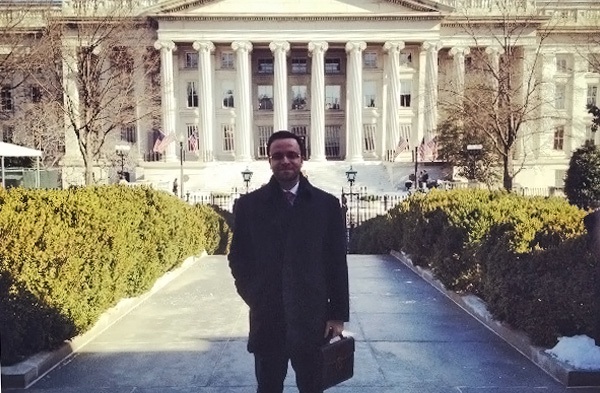PhD’s unemployment research leads to White House visit

Research conducted by Northeastern unemployment expert Rand Ghayad helped persuade a score of corporate chief executives to attend a meeting at the White House on Friday to discuss President Barack Obama’s new initiative to combat long-term joblessness.
“Everybody was saying they wouldn’t be here today if not for this research,” said Ghayad, a doctoral candidate of economics who was invited to the meeting by Gene Sperling, the president’s national economics adviser. “I never thought my work would be so interesting to other people.”
In response to Ghayad’s studies and others like it, Obama has persuaded more than 300 businesses to sign a pledge to halt hiring practices that discriminate against the long-term unemployed. Forty-seven of the country’s top 200 corporations have agreed to the new policies, including Apple, Wal-Mart, and General Motors.
Obama announced his initiative to help the long-term unemployed in his State of the Union Address last Tuesday, telling Americans, “I’ve been asking CEOs to give more long-term unemployed workers a fair shot at new jobs, a new chance to support their families.”
Ghayad’s research on unemployment discrimination and long-term joblessness has been well cited. In December of 2012, his work on why long-term unemployment has remained stagnant was published by the Federal Reserve Bank of Boston, where he is currently a visiting scholar. The Atlantic called the paper “pioneering,” while Nobel Prize-winning economist Paul Krugman noted in his New York Times blog that Ghayad’s work highlights “exactly the kind of thing we should fear, because it means that failure to address the slump is damaging the economy’s long run-prospects.”

On Jan. 31, President Barack Obama signed a Presidential Memorandum instructing federal agencies to adopt new hiring practices aimed at the long-term unemployed. Official White House Photo by Pete Souza.
In order to find out why his friends were having difficulty finding work in the wake of the recession, Ghayad sent out 3,500 fictitious résumés to companies with job openings. The only difference among the applicants was the amount of experience and length of unemployment. What he found was an “unemployment cliff”—once people had been unemployed for six months or more, their chances of being hired plummeted, even when their résumés were exactly the same as those who had been unemployed for less time.
His new, though as-yet-unpublished, study builds on his initial findings, suggesting that the long-term unemployed face discrimination in the labor market. Using the same set of 3,500 fictitious résumés, he found that recently unemployed applicants with no relevant experience were more likely to be invited for an interview than those with experience who have been unemployed for more than six months.
The upshot is that many otherwise well-qualified candidates get screened out of the hiring process based solely on a history of unemployment. What’s discouraging is that some well-qualified candidates are overlooked not by hiring managers or HR personnel, Ghayad said, but by software programs designed to screen out the long-term unemployed regardless of their experience.
Ghayad’s ultimate solution to combating long-term unemployment is to pump more cash into the economy at extremely low interest rates. With access to more cash, firms can hire more employees, including the job seekers at the back of the queue. “Once you create more jobs and boost the economy, there’s no reason to screen out applicants the way employers are doing it right now,” he said.
Obama agrees. “Every job applicant deserves a fair shot,” he told reporters on Friday. “Just because you’re out of work for a while doesn’t mean you’re not a hard worker.”





